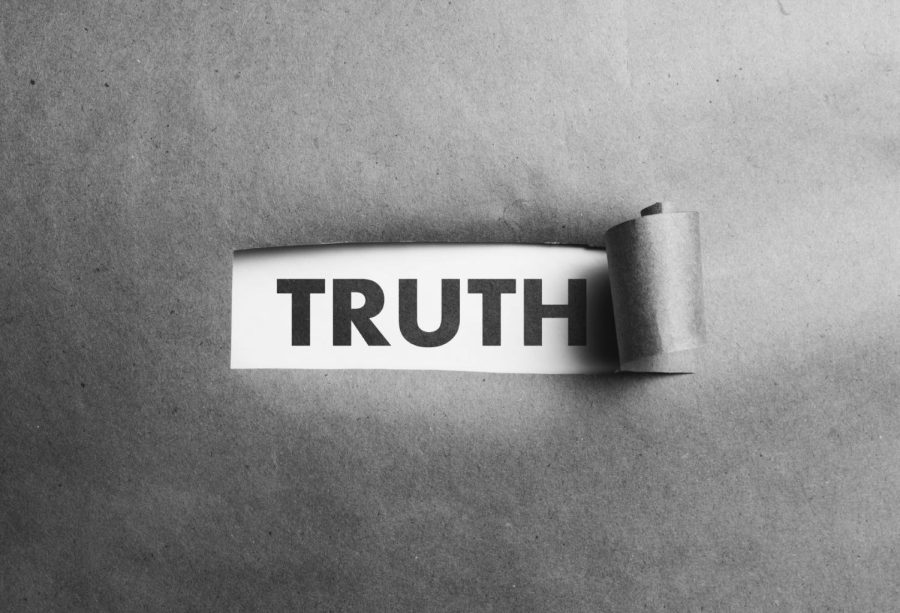On Relativism in Religion
Torn paper with truth word behind it, black and white photo
November 27, 2018
Contemporary Catholicism tends to complain about religious and moral relativism in the modern age. Pope Benedict XVI began his papacy decrying what he called the “Dictatorship of Relativism.” Catholic apologists regularly attack relativism by showing that it’s self-refuting or impracticable as a moral system. There are times when it is tempting to think that maybe we as Catholics are overestimating the power of relativism in our age. Or at least, sometimes I am tempted to think so. After all, modern Westerners still hold some very strong moral opinions. A cursory look at contemporary politics suffices to demonstrate that. Nevertheless, even if relativism hasn’t completely swept society, there is good reason to think that Benedict’s “dictatorship of relativism” is very real.
To see what I mean, let’s look at American religion. The sociologist Christian Smith once wrote about what he called “Moralistic Therapeutic Deism” when he examined religion among America’s youth. What Smith and his partner Melinda Lundquist Denton found among American teenagers was a set of ideas about religion that differs with much of Abrahamic religious orthodoxy. Overall, teenagers believed that God created the world, He answers prayers when people make petitions, but otherwise doesn’t care what people do with their lives so long as they’re nice. He also doesn’t particularly care what you believe, but He allows nice people go to heaven.
This vision of religion doesn’t square well with much of traditional Christianity, which maintains that Christ is the way, the truth and the life. In religions like Christianity and Islam, God certainly cares about what you believe, and your eternal soul’s fate could hinge on it. But it is not my aim here to demonstrate or defend specific religious truths. Rather, what I’m concerned with is how modernity treats religion in general.
The fundamental assumption that many moderns make about religion is that it is a private matter that should have no public consequences. At best, religion is a sort of hobby that people choose to do in their spare time, but not something that holds truth for all people. So, public proselytization is tantamount to imposing one’s private viewpoints or hobbies onto someone else. This is an inherently voluntarist understanding of religion. On this view, religion is basically a matter of personal will-to-belief, not a matter of truth, and therefore it can be believed and practiced however people please (so long as no one else is being harmed).
Thus, when the Vatican was performing a doctrinal assessment of American nuns’ commitment to Catholic orthodoxy a few years back, media headlines described it as a “crackdown on American nuns.” When florists and bakers decline to offer services for same-sex weddings, it’s described as bigoted discrimination. In this landscape, it’s hardly surprising that Smith and Denton found most teenagers to be largely indifferent about religious truth claims. What underlies these views is the notion that religion isn’t fundamentally about the truth, but about private choice of the will. In my various conversations about religion, I often encounter this attitude: “Well, your religion is just what you choose to believe, but I see things differently.”
Instead of understanding religion as attempting to grasp the deepest truths of the world, moderns tend to understand religion as relative. The problem with this assumption is that it doesn’t take religion seriously enough. At their heart, most religions make certain truth claims that underlie their various practices. Sometimes these truth claims differ wildly. Christianity claims that Jesus is the Resurrected Son of God. Islam and Judaism deny this and have other views of him. Buddhism claims that the ultimate cause of our suffering lies in desire. Other religions dispute that claim. From these examples, among countless others, we see that religions often make mutually exclusive truth claims. That means that they cannot be equally correct in their claims. It also means that these truth claims should be assessed for their veracity or credibility.
This means that religion, in no small way, summons us to use our minds. Religion is not a merely personal phenomenon. If it makes claims about truth, then it can engage with our reason. If it can engage with our reason, then it is not the case that proselytization is a mere imposition of the private will on another person: it is a means of summoning the mind to what are potentially the world’s deepest truths.
Religion then, is not a private, solipsist matter. It’s a matter of truth, that great reality that transcends us all but is closer to us than we are to ourselves. None of this is to say that faith is not deeply personal, but it is to say that religion engages the whole of the person. Religion, rightly understood, is not our private wills’ claims on the truth, but the truth’s claim on us.


